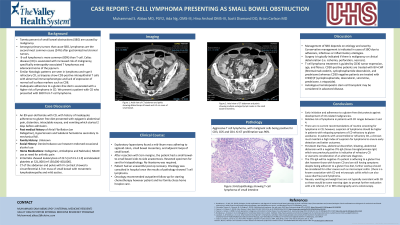Tuesday Poster Session
Category: Small Intestine
P5017 - T-Cell Lymphoma Presenting as a Small Bowel Obstruction
Tuesday, October 29, 2024
10:30 AM - 4:00 PM ET
Location: Exhibit Hall E

Has Audio

Muhammad s. Abbas, MD, MBBS
Valley Health System
Las Vegas, NV
Presenting Author(s)
Muhammad s. Abbas, MD, MBBS1, Ada Ng, 2, Hina Arshad, BS3, Scott Diamond, DO4, Brian Carlson, MD4
1Valley Health System, Las Vegas, NV; 2Touro University Nevada, Henderson, NV; 3Touro University Nevada, Easton, PA; 4Valley Hospital Medical Center, Las Vegas, NV
Introduction: Twenty percent of small bowel obstructions (SBO) stem from malignancy, with lymphomas ranking second (24%) after gastrointestinal stromal tumors. B-cell lymphomas predominate (80%) over T-cell variants. Celiac disease (CD) increases the risk of malignancies like enteropathy-associated T lymphomas (EATL) and jejunum adenocarcinomas. Histologically, lymphomas and type II refractory CD exhibit similar patterns, with abnormal CD3-positive intraepithelial T cells lacking typical surface markers like CD8. Poor gluten-free diet adherence heightens lymphoma risk in CD. Here, we describe a patient with CD presenting with SBO due to T-cell lymphoma.
Case Description/Methods: An 89-year-old female with CD developed sudden epigastric pain, distension, nausea, vomiting. Labs indicated leukocytosis of 22.5 [ref 4.5-11.0] and elevated platelets of 521,000 [ref 150000-450000]. CT of abdomen and pelvis with IV contrast revealed a 4.7cm small bowel mass, mesenteric lymphadenopathy, and mild ascites.
Exploratory laparotomy found a mid-ileum mass adhering to sigmoid colon, small bowel mesentery, and adjacent loops of small bowel. After resection with 5cm margins, the patient had a small bowel-to-small bowel side-to-side anastomosis. Pathology of the mass revealed aggressive T-cell lymphoma.
Discussion: SBO management varies by etiology and severity. Conservative management is indicated in SBO due to adhesions, infection, or inflammatory etiology. Surgery is indicated if there is malignancy or clinical deterioration due to ischemia, perforation, or necrosis.
T-cell lymphoma treatment is guided by CD30 tumor expression, age, and fitness. CD30-positive patients are treated with BV+CHP (brentuximab, vedotin, cyclophosphamide, doxorubicin, vincristine, prednisone, ± etoposide). Autologous hematopoietic stem cell transplant may be considered in advanced disease.
Early initiation and adherence to a gluten-free diet protects against development of CD-related malignancies. Relative risk of lymphoma in patients with CD ranges between 2 and 4. There are no current recommendations of routine screening for lymphoma in CD; however, suspicion of lymphoma should be higher in patients with relapsing symptoms of CD refractory to gluten avoidance. Evaluation with CT or MR enterography is recommended. In patients with uncontrolled or refractory CD, a clinician must maintain a high index of suspicion for lymphoma to ensure early detection and better outcomes.
Disclosures:
Muhammad s. Abbas, MD, MBBS1, Ada Ng, 2, Hina Arshad, BS3, Scott Diamond, DO4, Brian Carlson, MD4. P5017 - T-Cell Lymphoma Presenting as a Small Bowel Obstruction, ACG 2024 Annual Scientific Meeting Abstracts. Philadelphia, PA: American College of Gastroenterology.
1Valley Health System, Las Vegas, NV; 2Touro University Nevada, Henderson, NV; 3Touro University Nevada, Easton, PA; 4Valley Hospital Medical Center, Las Vegas, NV
Introduction: Twenty percent of small bowel obstructions (SBO) stem from malignancy, with lymphomas ranking second (24%) after gastrointestinal stromal tumors. B-cell lymphomas predominate (80%) over T-cell variants. Celiac disease (CD) increases the risk of malignancies like enteropathy-associated T lymphomas (EATL) and jejunum adenocarcinomas. Histologically, lymphomas and type II refractory CD exhibit similar patterns, with abnormal CD3-positive intraepithelial T cells lacking typical surface markers like CD8. Poor gluten-free diet adherence heightens lymphoma risk in CD. Here, we describe a patient with CD presenting with SBO due to T-cell lymphoma.
Case Description/Methods: An 89-year-old female with CD developed sudden epigastric pain, distension, nausea, vomiting. Labs indicated leukocytosis of 22.5 [ref 4.5-11.0] and elevated platelets of 521,000 [ref 150000-450000]. CT of abdomen and pelvis with IV contrast revealed a 4.7cm small bowel mass, mesenteric lymphadenopathy, and mild ascites.
Exploratory laparotomy found a mid-ileum mass adhering to sigmoid colon, small bowel mesentery, and adjacent loops of small bowel. After resection with 5cm margins, the patient had a small bowel-to-small bowel side-to-side anastomosis. Pathology of the mass revealed aggressive T-cell lymphoma.
Discussion: SBO management varies by etiology and severity. Conservative management is indicated in SBO due to adhesions, infection, or inflammatory etiology. Surgery is indicated if there is malignancy or clinical deterioration due to ischemia, perforation, or necrosis.
T-cell lymphoma treatment is guided by CD30 tumor expression, age, and fitness. CD30-positive patients are treated with BV+CHP (brentuximab, vedotin, cyclophosphamide, doxorubicin, vincristine, prednisone, ± etoposide). Autologous hematopoietic stem cell transplant may be considered in advanced disease.
Early initiation and adherence to a gluten-free diet protects against development of CD-related malignancies. Relative risk of lymphoma in patients with CD ranges between 2 and 4. There are no current recommendations of routine screening for lymphoma in CD; however, suspicion of lymphoma should be higher in patients with relapsing symptoms of CD refractory to gluten avoidance. Evaluation with CT or MR enterography is recommended. In patients with uncontrolled or refractory CD, a clinician must maintain a high index of suspicion for lymphoma to ensure early detection and better outcomes.
Disclosures:
Muhammad Abbas indicated no relevant financial relationships.
Ada Ng indicated no relevant financial relationships.
Hina Arshad indicated no relevant financial relationships.
Scott Diamond indicated no relevant financial relationships.
Brian Carlson indicated no relevant financial relationships.
Muhammad s. Abbas, MD, MBBS1, Ada Ng, 2, Hina Arshad, BS3, Scott Diamond, DO4, Brian Carlson, MD4. P5017 - T-Cell Lymphoma Presenting as a Small Bowel Obstruction, ACG 2024 Annual Scientific Meeting Abstracts. Philadelphia, PA: American College of Gastroenterology.
